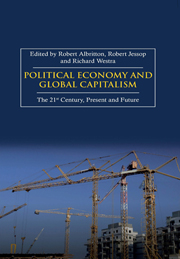Book contents
- Frontmatter
- Contents
- List of Abbreviations
- Notes on Contributors
- Introduction: Political Economy and Global Capitalism
- Part 1 Political Economy of the Present
- Part 2 Political Economy of a Progressive Global Future
- Introduction
- 6 Volatile, Uneven and Combined Capitalism
- 7 The Erosion of Non-Capitalist Institutions and the Reproduction of Capitalism
- 8 The Transformative Moment
- 9 Frontiers of Cadre Radicalization in Contemporary Capitalism
- 10 Green Marxism and the Institutional Structure of a Global Socialist Future
- Index
7 - The Erosion of Non-Capitalist Institutions and the Reproduction of Capitalism
from Part 2 - Political Economy of a Progressive Global Future
Published online by Cambridge University Press: 05 March 2012
- Frontmatter
- Contents
- List of Abbreviations
- Notes on Contributors
- Introduction: Political Economy and Global Capitalism
- Part 1 Political Economy of the Present
- Part 2 Political Economy of a Progressive Global Future
- Introduction
- 6 Volatile, Uneven and Combined Capitalism
- 7 The Erosion of Non-Capitalist Institutions and the Reproduction of Capitalism
- 8 The Transformative Moment
- 9 Frontiers of Cadre Radicalization in Contemporary Capitalism
- 10 Green Marxism and the Institutional Structure of a Global Socialist Future
- Index
Summary
Introduction
More than 150 years ago, in The Communist Manifesto, Marx and Engels observed that capitalism has a powerful tendency to destroy pre-capitalist relations and institutions:
The bourgeoisie, wherever it has got the upper hand, has put an end to all feudal, patriarchal, idyllic relations. It has pitilessly torn asunder the motley feudal ties that bound man to his ‘natural superiors’ … (Marx and Engels, 1848, p. 475)
Since those words were written, the continuing history of capitalism has borne them out. The vigorous accumulation process that capitalism gives rise to has continued to erode non-capitalist institutions. Feudal and semi-feudal relations throughout the world have, over time, dissolved under the pressure of capitalist penetration. Relations of independent commodity production, while not entirely eliminated, have been gradually reduced and increasingly marginalized.
However, capitalism has not eliminated all pre-existing non-capitalist institutions. In certain instances it reshaped them to suit its needs while retaining them as non-capitalist in form. Three examples that have been essential to capitalist reproduction are states, families and educational institutions. Such institutions are able to play a role in the reproduction of capitalism, not in spite of their internally non-capitalist form, but because of it, as will be explained below.
The tendency of capitalism to erode non-capitalist institutions potentially clashes with the need for non-capitalist institutions to be maintained in their supportive role in capitalist reproduction. A social system made up entirely of institutions that operate on capitalist principles and embody capitalist relations would not be viable.
- Type
- Chapter
- Information
- Political Economy and Global CapitalismThe 21st Century, Present and Future, pp. 159 - 176Publisher: Anthem PressPrint publication year: 2007



